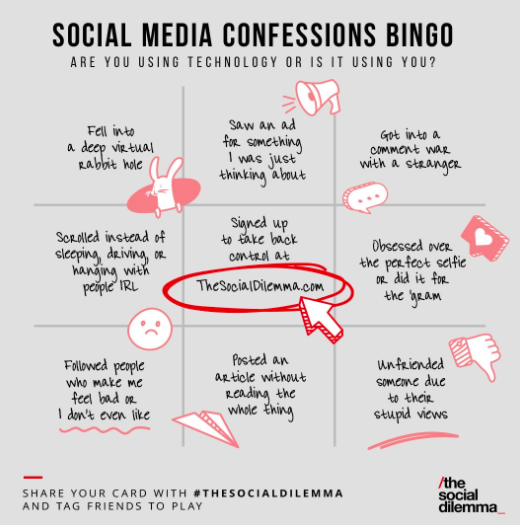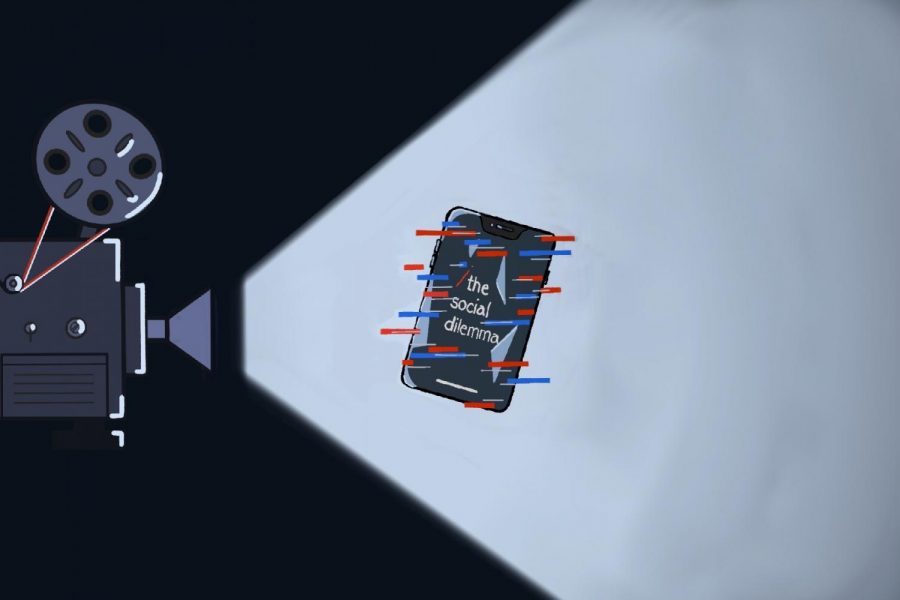Your donation will support the student journalists of Omaha Westside High School. Your contribution will allow us to purchase equipment and cover our annual website hosting costs.
“The Social Dilemma” and How a Good Message Can be Obscured by Poor Film Making
September 28, 2020
“The Social Dilemma” is a documentary-drama directed by Jeff Orlowski which combines real interviews from tech CEOs with staged, dramatized segments of a suburban family.
It’s impossible to say that the internet and social media hasn’t made a drastic shift in the way we view the world around us in the last 20 years. Through the advent of sites such as Facebook, Twitter, Instagram, or whatever your platform of choice is, we are more connected to each other than ever before, and with that comes an increase in dependence on cell phones and the internet for comfort in our times of need. In director Jeff Orlowski’s latest documentary-drama, “The Social Dilemma,” released on Sept. 9, this relationship between people and social media is explored through interviews with experts from the tech industry and staged dramatic scenes following the life of a typical suburban family. The film promises “secrets from inside the tech industry” and claims that it will “reveal the dark side of social media,” however, while the film does provide a surface-level depiction of some of the problems with modern-day technology, it ultimately falls into the trap of shock-value over substance. At its heart, “The Social Dilemma” has a good central message about “being more aware of how much social media impacts our lives,” but the majority of it feels like a repetitive, fear-mongering lecture that ultimately fails to inform its audience as much as scare them into believing everything it says.
The biggest problem that I have with “The Social Dilemma” is how much it insists on its own importance without having the information to back it up. To better explain, the first 20 minutes of this film are almost exclusively random, assorted news clips of anchors and celebrities saying things along the lines of “our democracy is under assault” and “the tools that have been created today are starting to erode the social fabric of our democracy.” Ignoring the fact that these are both blanket statements, which do nothing to add to the conversation about social media outside of scaring people, this “outrage montage” is solely in the film to grab your attention and shock you into continuing to watch. While it has long been a trope of documentaries to over-dramatize the issues they are about, “The Social Dilemma” has so much buildup at the beginning of it through intentionally vague dialogue that the ultimate problem the film brings up feels anti-climactic by comparison. This show of “insisted importance” is especially disheartening for a film that promises to delve deep into the virtues of social media, as all of the information presented in the film is extremely common knowledge. I can’t count how many times I’ve heard someone joke about having an ad targeted at them because they’ve searched something online, but this movie pretends targeted ads are “forbidden knowledge” that only higher up tech CEOs know about. Maybe I’m just more well-versed in technology than the average Joe, but this film does not seem to be anywhere as in-depth as its creators think it is.
Putting aside the surface-level information the film provides, easily the most difficult to watch parts in “The Social Dilemma” are the drama scenes in it. Right off of the bat, all of these sequences have performances in them which are akin to 1990s drug PSAs, and it is incredibly jarring to see in a film with this budget. Combined with the fact that the vast majority of these scenes are so incredibly melodramatic and trying impossibly hard to be relatable that all of the characters in them feel extremely one-dimensional and boring. One scene in particular towards the middle of the film, one of the main characters looks like he is going through intense physical pain after being challenged by his mom and sister to not use his phone for a week. Ignoring the fact that this scene is meant to be taken completely seriously, if you have that much of a problem trying to go without using your cell phone, I think you have much bigger problems that a “one-week texting break” isn’t going to solve. One of the most egregious aspects of the drama scenes to me was the personification of a phone’s algorithm in which it was given lines similar to a character from the Pixar movie “Inside Out.” If that idea makes no sense to you, trust me, it makes even less sense in the movie, and only serves as the film’s shoehorned attempt at a “comic relief” character which completely falls flat. Even the over-the-top emotional climax towards the end of the film feels forced and predictable. I won’t spoil it in case you’re still interested in watching the film, but if you’ve ever seen a movie in your life, you’ll likely know exactly where everything is going. There was no semblance of creativity put into any aspect of the film’s plot, and even if you think there is, you can guarantee it’s stolen directly from a Pixar movie.

A particularly offensive aspect of “The Social Dilemma” to me is the film’s blatant hypocrisy which it seems to take in stride. Although Netflix is easily one of the biggest time-sinks and addictive pieces of media for teenagers of today, you’d be hard-pressed to find a single Netflix logo anywhere in the film, but you’d better believe that every two seconds a YouTube or Facebook logo is being touted across the screen as a horror movie soundtrack plays. Another thing that feels distasteful about the film is the social media campaign that “The Social Dilemma” is parading across Twitter right now. The film has single-handedly inspired thousands of social media users to take to the site and spam hashtags and tweets about how fantastic the film is, all the while completely undermining the message of how much harm social media can do. Even the film’s own Twitter account, “@SocialDilemma_” has been tweeting out “Social Dilemma bingo cards” to post on your own social media accounts to share your experiences with the film. I might be old-fashioned, but doesn’t the film’s own social media page contradicting exactly what the film says show exactly how corporate and insincere this entire documentary is? I want to believe that the filmmakers behind this movie wanted the best for our future, but the amount of irony in this situation is a social dilemma in itself.
While it’s hard to say that the director and writers of “The Social Dilemma” didn’t have good intentions while making it, the film ultimately boils down to what feels like half “cheesy after-school special” and half “lecture from mom about how social media rots your brain.” Combine that with the constant fear-mongering, blanket statements about how social media will be the “downfall of our democracy,” and manipulative paralleling of our current situation with every Sci-Fi film imaginable, the film begins to feel like the very propaganda that it is fighting so hard to stop. If you’re looking for a movie to reaffirm your fears about cell phones and the internet, “The Social Dilemma” is one that will do it and do it well. However, if you’re looking to learn some actual “tech industry secrets”, or even feel like you did something worthwhile with your time, you’re probably better just scrolling through social media for an hour and a half on your phone.

